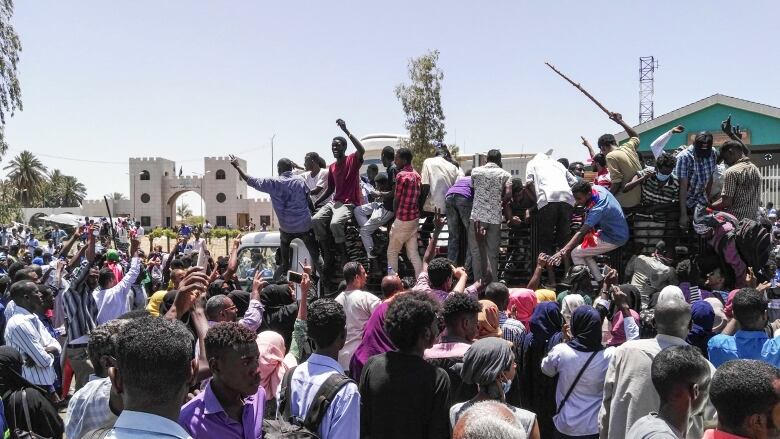Soldier reported killed, tear gas used in Sudanese protests
President Omar al-Bashir has resisted calls to compromise or step aside over weeks of protest

Sudanese security forces attempted to break up an anti-government sit-in outside the military headquarters in the capital Khartoum on Monday, setting off clashes in which a soldier was killed while trying to protect protesters, activists said.
Thousands of people rallied in front of the compound over the weekend in one of the biggest demonstrations since protests erupted in December calling for President Omar al-Bashir to step down. The protesters set up tents Saturday in what appeared to be an effort to replicate the mass sit-ins of the Arab Spring uprisings of 2011.
Security forces have used tear gas, rubber bullets and live fire to try to disperse the protesters, according to the Sudanese Professionals Association, which is spearheading the demonstrations. The Sudan Doctors Committee, an affiliate of the SPA, said the soldier was wounded while trying to protect the protesters and later died of his wounds.
The medical group said another man died elsewhere in Khartoum after being beaten and tortured by security forces.
Footage posted online by activists showed soldiers in uniform moving peacefully among the protesters, raising the possibility that some troops were intervening to halt the violence. During the 2011 uprising in neighbouring Egypt, the army stepped in to prevent clashes between protesters and police, and ultimately forced President Hosni Mubarak from power.
It was unclear whether such a scenario was underway in Sudan, where media access to the demonstrations has been heavily restricted. There was no immediate comment from the military, and a government spokesperson did not respond to calls seeing comment.
Grievances over cost of living, government
Protesters said security forces in pickups, mostly from the feared National Intelligence and Security Service, attacked the sit-in early Monday, firing tear gas, rubber bullets and live ammunition.
Activist Amal el-Zein said soldiers guarding the compound stood by at first, but then moved in to chase the security forces away, firing in the air.
Another activist said security forces later repeated their attempt to break up the sit-in, forcing protesters to seek shelter in a nearby navy facility. He said the military has deployed troops around its headquarters and blocked several roads leading to the complex. The activist spoke on condition of anonymity, fearing retaliation.
The protests were initially sparked by price hikes and shortages, but quickly escalated into calls for the resignation of al-Bashir, who seized power in 1989 in an Islamist-backed military coup. The protesters have adopted Arab Spring slogans, chanting "The people want the fall of the regime."
Al-Bashir, wanted by the International Criminal Court for war crimes allegedly committed in Darfur region in western Sudan earlier this century, has refused calls to step down and has appointed military officers to senior posts in an apparent attempt to close ranks. He has also declared a state of emergency and presided over a violent crackdown in which dozens of people have been killed.
The protests gained momentum last week after Algeria's President Abdelaziz Bouteflika, in power for 20 years, resigned in response to weeks of similar protests.












_(720p).jpg)


 OFFICIAL HD MUSIC VIDEO.jpg)
.jpg)



























































































